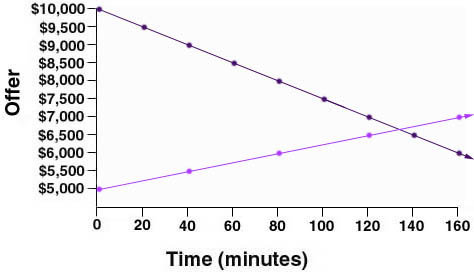
◙◙◙◙◙◙◙◙◙◙◙◙◙◙◙◙◙◙◙◙◙◙◙◙◙◙◙◙◙◙◙◙◙◙◙◙◙◙◙◙◙◙◙◙◙◙◙◙◙◙◙◙◙◙◙◙◙◙◙◙◙◙◙◙◙◙◙◙◙◙◙◙◙◙◙◙◙◙◙◙◙◙◙◙◙◙◙◙◙◙◙◙◙◙◙◙◙◙◙◙◙◙◙◙◙◙◙◙◙◙◙◙◙◙◙◙◙◙◙◙◙◙◙
You could either make smaller concessions or make slower concessions to hope to obtain a more favorable agreement for your side.
For example, if you make smaller concessions of $300 rather than $500 every 20 minutes, the graph will look like this:

Alternatively, you can make concessions more slowly. If you made the same $500 concessions as earlier, but made them every 30 minutes rather than every 20, then you would obtain a more favorable settlement -- although it would take longer. So if "time is on your side" then it would pay in this situation to make concessions slowly and hope the dealer would make the bulk of the concessions.
If you have a very predictable opponent, you may be able to guess at what the likely settlement will be and can adjust your offers to get a somewhat more favorable deal. This is called "tracking" (it is also called "bracketing").
Adjusting your concessions in order to get the best deal ("tracking") will be enhanced if you let the other side make the opening offer. After he has made his initial offer, then you can select your initial offer and can make it low (or high) enough that you have room for concession making.

Dr. Ross used tracking once when he was in graduate school and needed to buy a couch for his unfurnished apartment. Visiting yard sales, he found one couple who had married and had too much furniture -- so they were eager to sell some. The lady asked $95 for a couch. Dr. Ross had other furniture to buy, so he didn't want to spend more than $80 on this couch. Consequently, he offered $65. The lady made a counter-offer of $90 and Dr. Ross came up to $70. The lady made additional $5 concessions and Dr. Ross made additional $5 concessions and he bought the couch for $80. He was "tracking" his offers in order to only spend $80. Had he tried harder, he might have been able to get the couch for less, say $78. However, he didn't want to take advantage of the poor lady. (Incidentally, he kept the couch for eight years, so he got his money's worth out of it; then he donated it to Goodwill -- who probably sold it to your landlord who probably put it in your student apartment!)
| Review Question: | ||
|---|---|---|
| What is "tracking" in bargaining? | ||
|
|
A control knob that you find on a Video Cassette Recorder (VCR). | |
|
|
Where you make your "last offer first," and then stick to your position. | |
| Where you adjust your offers in order to achieve a specific settlement. | ||
|
|
Where you make a series of very small concessions, in order to show you are "bargaining in good faith." | |
Of course, in real negotiations, people rarely follow such a rigid schedule of concession making. Further, how much they offer and how frequently they change their offer often depends upon what the other side says and does. These complexities will be examined more fully next.
◙◙◙◙◙◙◙◙◙◙◙◙◙◙◙◙◙◙◙◙◙◙◙◙◙◙◙◙◙◙◙◙◙◙◙◙◙◙◙◙◙◙◙◙◙◙◙◙◙◙◙◙◙◙◙◙◙◙◙◙◙◙◙◙◙◙◙◙◙◙◙◙◙◙◙◙◙◙◙◙◙◙◙◙◙◙◙◙◙◙◙◙◙◙◙◙◙◙◙◙◙◙◙◙◙◙◙◙◙◙◙◙◙◙◙◙◙◙◙◙◙◙◙